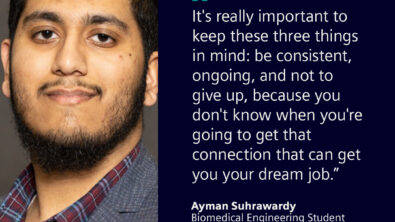The skills that set you apart: Candid advice from Siemens professionals for early-career engineers

Making the leap from college to career can be daunting. The unfamiliar tools, the shift from classroom projects to cross-functional collaboration — it’s a lot to navigate. That’s why we spoke with two Siemens professionals to get their advice on what they wish more students and recent graduates understood about today’s engineering workplaces.
Hani Qaqish, now leading NX X Manufacturing, began as an intern and quickly advanced to oversee the transformation of NX CAM into a SaaS offering. Trevor Bengtsson, with a decade of experience in automotive pre-sales, partners with major automotive manufacturers and their supply chains.
Together, they offer insights to help engineering students step confidently into their next chapter.
Looking to get advice from the people making hiring decisions? Watch our on-demand AMA with an engineering hiring manager and recruiter to get expert advice on crafting standout resumes, acing interviews and more.
Starting with ‘why’ matters
As a student, you might often wonder: “When will I ever use this?”
Hani emphasizes the importance of understanding the ‘why’ behind your work. “In college, I did a lot of work without always understanding why,” he said. “But in the industry, the ‘why’ matters. It helps connect your work to the product, the user and the business.”
Trevor agrees: “It’s okay to ask why. In fact, it’s necessary. That kind of thinking drives innovation.”
To grasp the ‘why,’ get hands-on, said Trevor. Build something. Test an idea. Shadow a professional. Attend a plant tour. Real-world experience bridges the gap between theory and practice.
Three skills that set you apart: Communication, collaboration and credentials
Engineering thrives on teamwork. “There’s a huge collaborative force behind every product,” Trevor explained. “In the automotive industry, it takes everyone from chipmakers to trim suppliers to turn a concept into reality. If you can collaborate well and take input from different specialists, you’re setting yourself up for success.”
Start honing these skills now with classmates, project partners and professors. Clear communication, pitching ideas, seeking help and providing feedback are all vital.
Equally important is being prepared. Familiarity with tools like CAD software, PLM systems or cloud platforms can give you an edge. “The NX Design certification helped me land my Siemens internship,” Hani shared. “Being familiar with industry tools shows initiative and helps you hit the ground running.”
To learn the same tools used by industry, students can download our software for free as well as go through industry-grade software training on Siemens Xcelerator Academy.
Another emerging skill is understanding data. Hani noted that as engineering teams and product complexity grow, managing data is as crucial as managing parts. Knowing how data flows across systems and tools like Teamcenter can make you stand out.
However, it’s not just about ticking boxes. Hani advises choosing certifications that count. “Look for credentials reviewed by professors, industry professionals and peers. The right ones add real value.”
Hani’s pro tip? Find a study buddy or form a certification group.
“Doing it together makes it more fun and keeps you accountable.”
Siemens’ new Expedite — Skills for Industry microcredential is designed to help students gain and verify key skills for today’s engineering workplaces. Learners can enroll now on Coursera or visit our website to learn more.
Confidence starts with curiosity
“Everyone feels imposter syndrome,” Hani said. “But your ability to learn is more important than what you know today. Keep showing up, keep learning and the job will come.”
Curiosity combats self-doubt. When you’re new to the workforce, asking questions and staying open helps build confidence. You don’t need all the answers, just the willingness to grow.
Trevor added: “Companies are looking for fresh perspectives and that includes yours. Don’t wait until you feel ‘ready’ to jump in. Collaborate, ask questions and share your ideas. That’s how real growth happens.”


